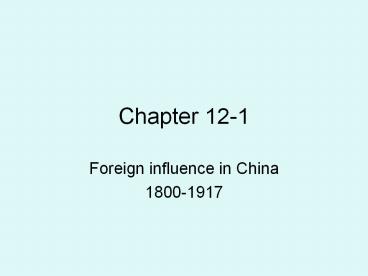Foreign influence in China - PowerPoint PPT Presentation
1 / 14
Title:
Foreign influence in China
Description:
Chapter 12-1 Foreign influence in China 1800-1917 European arrival and Chinese reaction Europeans brought with them items to trade but the Chinese were not impressed. – PowerPoint PPT presentation
Number of Views:95
Avg rating:3.0/5.0
Title: Foreign influence in China
1
Chapter 12-1
- Foreign influence in China
- 1800-1917
2
European arrival and Chinese reaction
- Europeans brought with them items to trade but
the Chinese were not impressed. - China believed it was self sufficient.
3
Chinese self sufficiency
- China believed it was self sufficient because
- It had a healthy agricultural economy
- Plentiful rice in the south
- Maize, corn and potatoes from the Americas
- Mining, manufacturing, salt and tin was abundant.
4
Guangzhou
- The only trade port in all of China open to
foreigners. - All trade controlled by China
- China had a favorable balance of trade.
5
Opium Wars
- Causes- Qing emperor demanded that Britain stop
sending Opium to China, Britain refused. - In 1839 war broke out but England won because of
its superior weapons and navy. - Treaty of Nanjing- peace treaty ending the war
and giving Britain control of Hong Kong and
foreigners given extraterritorial rights (not
subject to Chinese laws) - Greatly increased Chinese resentment of
foreigners.
6
Chinese international problems
- Population grew by 30 but food supplies could
not keep up. - Hunger, famine and opium addiction spread.
- Soon the Qing faced rebellion.
7
The Taiping Rebellion
- Hong Xiuquan built an organization called the
Heavenly Kingdom of Great Peace. - Its goal was to share the wealth and allow no
poverty. - In 1853, rebellion broke out and his 1 million
man army captured Tapai. - He withdrew from public life and 11 years later
the kingdom collapsed due to foreign troops and
the imperial army.
8
Empress Cixi
- Proposed that China start a self strengthening
movement - The goals were to update Chinas educational
system, diplomatic system and its army in order
to resist foreign influence.
9
Europeans move into China
- Nations took advantage of a weakened China as it
had failed to strengthen fast enough. - Treaties had also given foreign nations control
over parts of China and its economy. - Countries also formed spheres of influence in
China- Chinese trade and investment controlled by
foreign nations. - Page 338 map shows how many countries were in
China
10
Open Door Policy
- Letters written by Sec. of State John Hay that
stated - China needed to open to free trade.
- The U.S. would protect its right to free trade in
China - This meant the U.S. had moved into China as an
imperial power along with European nations.
11
Boxer Rebellion
- A group known as the Society of Righteous and
Harmonious Fists resented foreign influence in
China and rebelled against the Dowager Empress. - In 1900, foreign property was destroyed and
foreigners were killed or kidnapped. - This rebellion was broken up by a foreign army
including the U.S., British, French, and German
troops totaling 19,000 men.
12
The Boxer Rebellion
13
Impact of the Boxer Rebellion
- Empress knew she needed to reform China or face
further revolt. - She began to send diplomats throughout the world
in order to study western political ways. - She created a national assembly along with a full
constitutional government. - Strong sense of nationalism starts to emerge in
China
14
The last emperor































